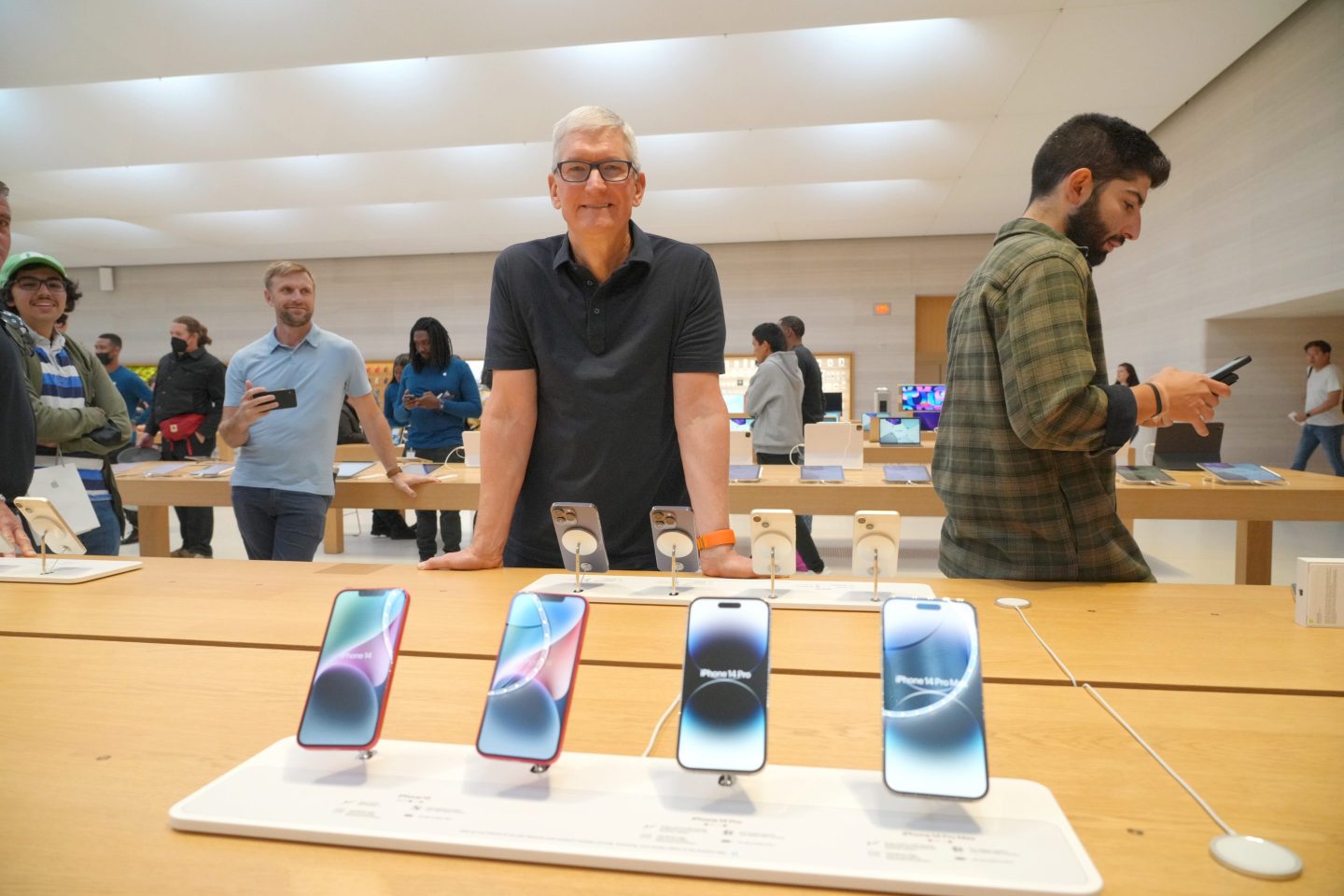Hi, it’s tech intern Stephen Pastis writing for you today.
Apple just achieved a major milestone, garnering 1 billion subscribers in its most profitable business—and investors are acting like the phones are bending again.
Apple’s stock is down about 3% today, following the results of Apple’s latest quarter. That’s about $90 billion worth of market value wiped out.
What’s behind this very costly disconnect?
iPhone sales fell compared to this time last year. A downward trend in iPhone sales like this hasn’t happened since 2016, and the company saw revenue decline for the third straight quarter.
It’s a sign of a slowing down in the U.S. for Apple’s bread-and-butter product: the iPhone. It’s a tough time for mobile phones, to be sure. While there are mixed reviews from investors, some point out that the next quarter will be the iPhone’s time to shine, and others point to the growth in emerging markets like India and China.
But the severe market reaction points to an identity crisis that could haunt Apple for some time yet.
Apple has been recasting itself as a services business for a while. It has continuously released new and updated subscription options providing things like cloud storage, music, and news. Don’t forget Apple invested enough money into Apple TV to nab an Academy Award for best picture, beating Netflix to the win. And Apple’s securing the rights to Major League Soccer and bringing Lionel Messi to a Florida soccer team are some of the biggest moves in sports and streaming right now.
Apple reported an all-time high in services revenue for the quarter, coming from the record-setting 1 billion subscribers to Apple services during June. And as Piper Sandler’s analyst Harsh Kumar told Fortune, services have a much higher profit margin than hardware devices. If Apple sees more subscribers, that’s more direct dollars to the bottom line, he said.
But if consumers stop buying as many Apple hardware devices, will the foundation for the services business crumble? That seems to be Wall Street’s current view. Apple executives have themselves contributed to this view: In the recent earnings call, they boasted about how customers who own more than one Apple device are typically more engaged in the Apple ecosystem and tend to spend more on the services front.
Apple may see services as the engine of its future financial growth, but for consumers and investors, Apple is still a hardware company.
Stephen Pastis
Data Sheet’s daily news section was written and curated by David Meyer.
NEWSWORTHY
Record robocaller fine. The U.S. Federal Communications Commission has hit “the largest illegal robocall operation the agency has ever investigated” with a record fine of $299,997,000. The multinational operation made more than five billion robocalls in three months back in 2021. But according to Ars Technica, the FCC is deeply unlikely to get its money, as the guy at the center of the operation has previously been unable to pay millions of dollars in penalties for similar telemarketing crimes.
First Tesla range inflation suit. Tesla is facing a class action lawsuit, courtesy of disgruntled customers who saw a Reuters scoop about the EV giant overstating range estimates for its vehicles. As Reuters now reports: “The lawsuit alleges Tesla breached vehicle warranties and engaged in fraud and unfair competition.”
Farewell, personalization. Thanks to the EU's new Digital Services Act, TikTok users there will be able to switch off the personalized algorithm that dictates what they see in their feeds. Per The Verge, the platform is also turning off personalized ad-targeting for teens by default. TikTok's big rivals will all have to make similar changes.
ON OUR FEED
“More than a month has passed, and as things on the internet go, the passion for the protest has waned and people’s attention has shifted to other things.”
—A moderator of the /aww subreddit, which protested against recent Reddit changes by focusing entirely on the comedian and TV host John Oliver. As The Verge notes, three temporarily Oliver-obsessed subreddits including /aww have now gone back to business as usual.
IN CASE YOU MISSED IT
Tim Cook answers critics about why Apple’s A.I. efforts seem so far behind Microsoft, Google and Elon Musk, by Christiaan Hetzner
Andy Jassy summed up Amazon’s A.I. gameplan: Every single business unit has ‘multiple generative A.I. initiatives going on’, by Rachyl Jones
Five months ago Crunchbase vowed to try and avoid layoffs. Since then A.I. has changed everything, by Jessica Mathews
I’ve spent 25+ years in the semiconductor industry. Here’s why I’m confident we can take on the A.I. challenge, by Michelle Johnston Holthaus
‘Incredibly suspicious’: A union is accusing Google of violating labor law by retaliating against workers for organizing, by Bloomberg
Mark Zuckerberg’s wife is not happy he put a fighting cage in their backyard to help with his fitness transformation, by Paige Hagy
BEFORE YOU GO
Going local-first. Wired has a great piece on the nascent “local-first” movement, which is trying to cut the cloud out of the equation when building collaborative software that can be accessible from multiple devices. The idea has been taking Silicon Valley by storm in the last few years, but it can be dated back a couple decades to the creation of something called a conflict-free replicated data type (CRDT) algorithm.
As writer Gregory Barber describes the concept: “Create many replicas of the same file, each of which automatically snaps to a state identical to its peers, like atoms in quantum entanglement. Whether you edit your replica first and then receive my changes, or I edit my replica and then receive your changes, the algorithm produces the same result for us both.” Developers have now figured out how to implement the idea in actual apps.
This is the web version of Data Sheet, a daily newsletter on the business of tech. Sign up to get it delivered free to your inbox.












